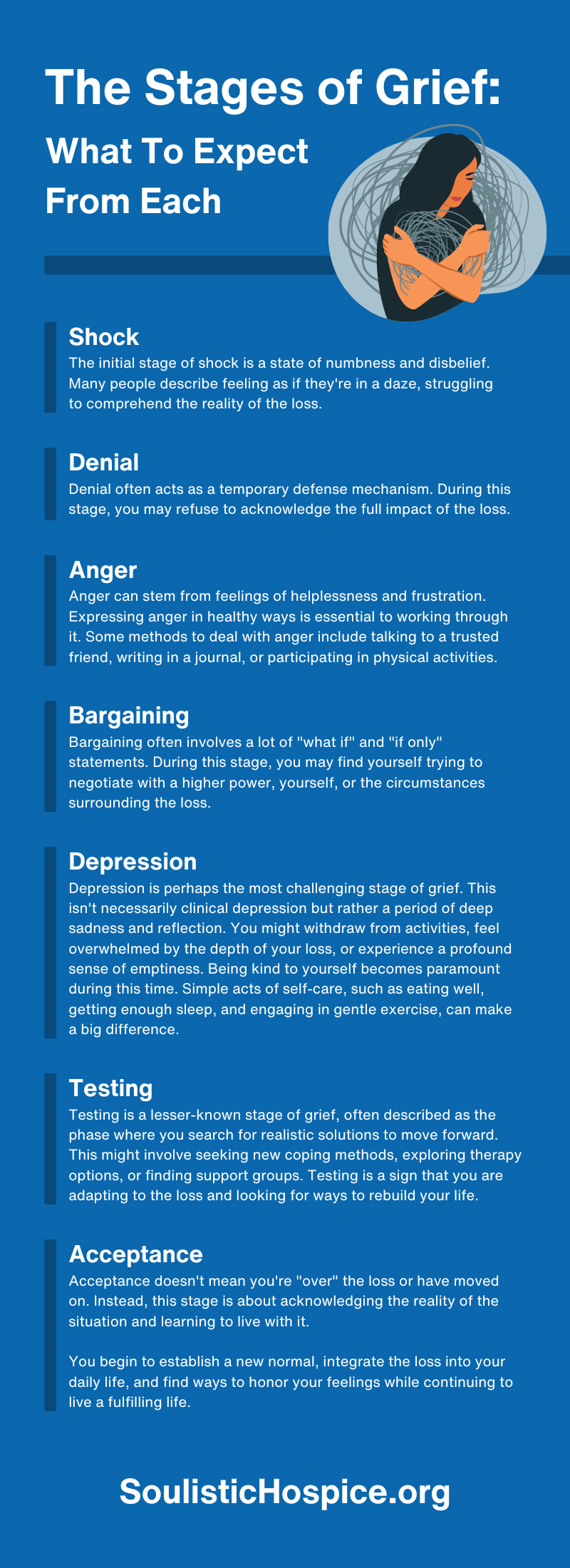
Grief is an emotion most of us will experience at some point in our lives, yet it remains a deeply personal and often isolating process. Whether you're dealing with the loss of a loved one, a significant life change, or another type of trauma, understanding grief can offer comfort and clarity as you work your way through the process. We’ll discuss the stages of grief and what to expect from each, providing helpful insight that can guide you on your journey.
What Is Grief?
Grief is a natural response to loss, an intrinsic part of the human experience that everyone encounters at some point in their lives. The response involves the emotional suffering you feel when something or someone you love is taken away, and it manifests in different ways for different people.
The pain of grief can be overwhelming, often leaving you feeling a wide range of emotions, such as sadness, anger, confusion, and even guilt. At times, these emotions can be so intense that you might find yourself questioning your ability to cope with the situation.
While grief is most commonly associated with the death of a loved one, it can stem from any significant loss or change in life. This might include the end of a relationship, losing a job, experiencing a major life transition, or even the loss of a cherished dream.
Each person's journey through grief is unique, with its own timeline and challenges. Understanding that grief is a personal process can help provide the patience and compassion needed to heal. Despite its challenges, working through grief can eventually lead to personal growth and a renewed perspective on life.
Common Times People Experience Grief
The experience of grief isn't limited to the loss of a person. Various circumstances can trigger this complex set of emotions.
Divorce or the end of a relationship, loss of a job, miscarriage, and even the loss of a beloved pet are all common scenarios where individuals might find themselves grieving. Each situation brings its own unique challenges and emotional responses.
Different Types of Grief
Grief isn't a one-size-fits-all experience. There are different types of grief that people may encounter.
Anticipatory grief occurs when you know a loss is coming, giving you time to prepare emotionally. Complicated grief is when the feelings of loss are debilitating and don't improve over time. Disenfranchised grief arises from losses that aren't socially recognized, such as the loss of a partner in an extramarital affair.
Understanding these different types can help you identify and validate your own feelings.
Understanding the Stages of Grief
Elizabeth Kübler-Ross introduced the concept of the stages of grief in her 1969 book On Death and Dying. The stages—shock, denial, anger, bargaining, depression, testing, and acceptance—are meant to provide a framework for understanding the emotional trajectory of grief. However, everyone will experience all stages, and they may not occur in a linear fashion.
Shock
The initial stage of shock is a state of numbness and disbelief. Many people describe feeling as if they're in a daze, struggling to comprehend the reality of the loss.
This is your mind's way of protecting you from the overwhelming emotions that follow. During this time, allowing yourself to feel whatever comes up without judgment is crucial.
Denial
Denial often acts as a temporary defense mechanism. During this stage, you may refuse to acknowledge the full impact of the loss.
Denial helps minimize the immediate pain and allows you to gradually process the reality of the situation. Taking your time in this stage is okay; your mind and heart will adjust at their own pace.
Anger
Anger is a natural part of the grieving process, though it can be unsettling. You may feel anger directed at yourself, others, or even the person who has died.
Anger can stem from feelings of helplessness and frustration. Expressing anger in healthy ways is essential to working through it. Some methods to deal with anger include talking to a trusted friend, writing in a journal, or participating in physical activities.
Bargaining
Bargaining often involves a lot of "what if" and "if only" statements. During this stage, you may find yourself trying to negotiate with a higher power, yourself, or the circumstances surrounding the loss.
This is a way of attempting to regain control and avoid the painful reality. Recognize that these thoughts are a normal part of your grief process and allow yourself to explore them.
Depression
Depression is perhaps the most challenging stage of grief. This isn't necessarily clinical depression but rather a period of deep sadness and reflection. You might withdraw from activities, feel overwhelmed by the depth of your loss, or experience a profound sense of emptiness. Being kind to yourself becomes paramount during this time. Simple acts of self-care, such as eating well, getting enough sleep, and engaging in gentle exercise, can make a big difference.
Testing
Testing is a lesser-known stage of grief, often described as the phase where you search for realistic solutions to move forward. This might involve seeking new coping methods, exploring therapy options, or finding support groups. Testing is a sign that you are adapting to the loss and looking for ways to rebuild your life.
Acceptance
Acceptance doesn't mean you're "over" the loss or have moved on. Instead, this stage is about acknowledging the reality of the situation and learning to live with it.
You begin to establish a new normal, integrate the loss into your daily life, and find ways to honor your feelings while continuing to live a fulfilling life.
Practical Tips for Coping with Each Stage
Navigating grief is a profoundly personal experience, but there are practical tips that can help you cope with each stage:
- Shock: Allow yourself to feel numb. Lean on loved ones, and don't rush the process.
- Denial: Gently remind yourself of the reality when you're ready. Journaling can help.
- Anger: Find healthy outlets for your anger, such as exercise or art.
- Bargaining: Speak with a counselor or trusted friend to process your thoughts.
- Depression: Prioritize self-care and seek professional help if needed.
- Testing: Explore new activities and support systems that can aid your healing.
- Acceptance: Celebrate small victories as you adapt to life after loss.
Receive Support from Soulistic Hospice
Understanding the different stages of grief can provide a roadmap for navigating the tumultuous emotions that come with loss. Each stage serves a purpose in the healing process, helping you gradually come to terms with your new reality. Remember, there's no right or wrong way to grieve, and everyone's journey is unique.
If you or someone you know is struggling with grief, contact Soulistic Hospice for compassionate bereavement care in Arizona. Our professional team is here to support you every step of the way.









